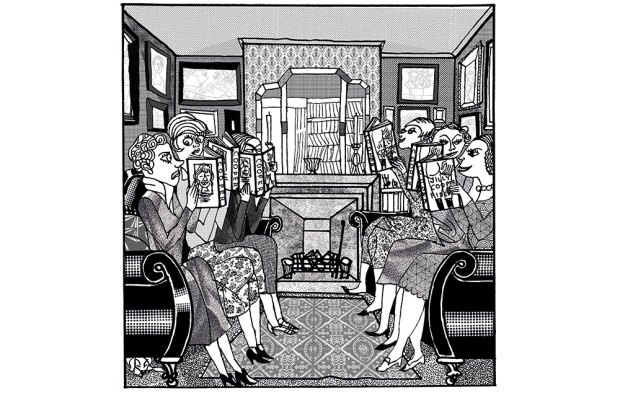‘We don’t just have snags with this house — “snags” suggests issues that are minor,’ says Kelsey Aldritt of her new-build Persimmon house just outside Pembroke, Wales. ‘This house has had major problems from the moment we moved in.’ Kelsey is six months pregnant and the doctor has told her not to get stressed, but with a house like this, stress is unavoidable.
‘It really angers me that Persimmon gave us such a defective house,’ says Kelsey’s partner, Theo. ‘Nothing is built right — and I don’t want Kelsey upset, worrying about chasing Persimmon to do repairs, not at a time like this.’
The case of Kelsey and Theo is far from exceptional. I’ve reported on countless ‘new-build nightmares’ over recent years. Social media is full of support groups of young homeowners suffering at the hands of large housebuilders.
Boris Johnson is convinced that solving the UK’s chronic housing shortage will return successive Tory governments. More homeowners means more Tory voters: that’s the rationale behind the government’s proposed planning reforms — which aim to increase the number of building permissions granted. But to solve the problem, the new builds must be properly constructed, and currently they’re not.
Johnson’s vision for housing was upended by last week’s shock defeat in Chesham and Amersham — when the Lib Dems overturned a huge government majority in the prosperous London commuter seat after a campaign focused on planning. Rebel Tory backbenchers complain that while the country needs more houses, residents are worried that infrastructure (roads, schools, GP clinics) won’t follow. When they raise concerns, they’re written off as ‘Not In My Back Yard’ whingers — as Nimbys. Plenty of Tory MPs saw this resentment reflected in last week’s by-election defeat.
‘The government has a duty to make sure more homes are built,’ said Communities Secretary Robert Jenrick after the Chesham defeat. ‘Home ownership should be achievable for all who dream of it.’ To worried Tory backbenchers, this sounds dangerously like ideology: houses for the sake of houses. What no one is asking about is the quality of these houses, and so for many young people (and their parents) new builds have become more of a trap than a ladder.
The cladding scandal is a case in point. Shoddy, dangerous workmanship was exposed, which was one thing, but then the extortionate cost of fixing the problem was passed on to homeowners. Ministers (such as Jenrick) can suddenly change regulations and demand remediation, meaning that millions of young people who were trying to save instead become liable for tens of thousands of pounds of repairs. Even the risk of this happening has shattered faith in home ownership. It adds up to a fundamental market failure, which at heart is the result of a dangerous concentration of power in a handful of overmighty housing giants who dominate the residential construction industry in Britain.
In the autumn, four of the UK’s largest housebuilders — Barratt, Countryside, Persimmon and Taylor Wimpey — came under investigation for the way they have been selling leaseholds. But there are more questions that could and should be asked of this little mafia. Why and how has a small group of companies been able to act like a cartel, deliberately slowing down construction and suppressing competition? The big losers are, unsurprisingly, the buyers of these homes.
Changing the current planning reforms will do little to change the underlying problem. Ministers argue the ‘lack of land with planning permissions’ explains why there should have been two to three million more homes built since the turn of the century. The reality, however, is that four-fifths of residential planning applications are now accepted — and permits to build more than a million homes remain unused.
This is because these big developers hoover up permits and then sit on them, producing far fewer homes than are needed. The supply shortage and resulting pent-up demand keep prices rising, ensuring the developers make higher profits overall.
The real problem, in short, is not planning reform but the ever-lengthening delays between permission being granted and homes being built. Removing local councils from the planning process, which is what these plans propose, will do little to change this fundamental issue. ‘The UK’s big developers have become far too powerful,’ says Michael Forsyth, chair of the Lords’ Economic Affairs Select Committee. ‘In terms of the quality of homes built and consumer misery, these companies produce outcomes that are really quite nasty — this is not how capitalism is supposed to work.’
Instead of competing on quality and price, as should happen in a functioning market, home-building is carved up into localities, often giving prospective buyers little choice. A major problem, says the former Downing Street housing adviser Alex Morton, is that planning permission is ‘a one-way gift which boosts the value of the land from, say, £20,000 a hectare to £2-£3 million, in return for no obligation to do anything beyond breaking ground’. As a result, he says, ‘housebuilding is largely in the hands of a few large builders and a cottage industry of land promoters, pushing up the value of land with permissions, which means permissions often don’t translate into homes’.
The current system thus ‘incentivises large housebuilders to acquire and control land,’ says Morton. The six largest firms currently hold over a million plots, 90 per cent of them controlled by the biggest three, Taylor Wimpey, Barratt and Persimmon. This is clearly a very long way from being a competitive market.
Before the 2008 financial crisis, thousands of small and medium-sized companies built almost three-quarters of new homes. Such firms build out permissions quickly, helping to keep the industry competitive. But as countless smaller operators were wiped out by the credit crunch, the industry rapidly consolidated. By 2016 the UK housebuilding industry had ‘all the characteristics of an oligopoly’, according to a report published by Forsyth’s committee. Now smaller firms account for barely a third of new-build homes.
Faced with so little competition, the housebuilding giants became bandits. In 2018, Persimmon became the first British housebuilder to make an annual profit of over £1 billion. And even in 2020, despite the impact of the Covid lockdowns, they returned £863 million.
Are these returns really justified? Are margins of almost 30 per cent defendable in an industry which so often blights the lives of millions of ordinary customers?
The UK’s fundamental shortage of homes — to both rent and buy — explains why today’s young adults now spend more on housing and are more likely to be priced out of home ownership than any generation since the 1930s. Owner-occupancy rates have plunged among 25- to 34-year-olds, from 70 per cent in the mid-1990s to 40 per cent now — with half a generation denied the security of home ownership at this crucial family-starting age.
While 3.1 million homes were built across the UK throughout the 1960s, that fell steadily to 1.5 million during the 2000s, and to 1.3 million during the decade from 2010. The resulting upward spiral in house prices, which grew much faster than earnings, explains why the share of UK households renting has doubled over the past 20 years — a trend Johnson is determined to reverse, with property ownership central to the Conservative brand.
‘Too many young homebuyers are getting ripped off, paying through the nose for poor new-build housing,’ says John Myers, co-founder of the Yimby Alliance — a fast-growing group of ‘Yes In My Back Yard’ aspiring homebuyers. ‘Millions of young voters are upset and angry to be stuck in house-shares — because of a lack of proper competition and a system stacked in favour of the big guys.’
The housing cabal has been aided and abetted, of course, by Help-to-Buy — a government subsidy focused on new builds which has overwhelming gone to the big operators, juicing up both house prices and profits further, while making new homes even less affordable for the majority who are unable to access the scheme.
Perhaps the most visible failure has happened since the 2017 Grenfell disaster, with hundreds of thousands of leaseholders now facing ruinous bills to replace cladding suddenly made retrospectively illegal, fixing fire-safety issues that homebuilders should have addressed in the first place.
It’s an issue that has disproportionately hit young homeowners — many of whom bought their flats via government-backed schemes — making it impossible for them to sell up and move on. In the eyes of many, it’s another example of ministers siding with powerful property-sector players — to the detriment of aspiring youngsters who have worked hard and saved to get on the housing ladder but are now feeling betrayed by a Tory government.
Persimmon did eventually partially repair Kelsey and Theo’s home — but only after I reported their case on national television. ‘They finally contacted me after your programme and made some alterations,’ Kelsey tells me. ‘But I’m not comfortable being in this house long-term — and I’d never buy a new build again.’
Big Housing needs to be challenged on multiple fronts. Planning permissions should become ‘delivery contracts’, coming with legal obligations to build out within a certain timeframe — or developers must start paying council tax on unfinished units. That would force large housebuilders to focus on building, not land speculation.
The 1961 Land Compensation Act should be reversed, so when land is given planning permission and valuations surge, this massive ‘planning uplift’ is shared with local authorities — an idea backed by successive parliamentary inquiries. That would dampen land speculation, making building plots — and ultimately housing — more affordable. It would also fund new infrastructure as new housing appears, revolutionising the local politics of planning.
Better regulation is needed, given that big housebuilders routinely sell new builds using contracts which prevent homebuyers from conducting their own survey before taking ownership. When making the most important purchase of their lives, new-build buyers have fewer consumer rights than when buying a toaster.
Above all, a full Competition and Market Authority inquiry into UK housebuilders is long overdue. Powerful vested interests benefit mightily from this high-price, low-build-quality gridlock. They make big political donations to protect the status quo.
There are about 90 Tory MPs now in the WhatsApp group on planning (the modern-day rebel caucus) and they are determined to act. It would take half this number to defeat the government.
So diverting attention from bungled, highly controversial planning reforms towards ensuring the housebuilding industry doesn’t routinely rip people off has gone from being a long overdue agenda to a political imperative. The Tories must now confront the power of housebuilders and side firmly with young, aspiring buyers. They must show the housing mafia who is boss.
Got something to add? Join the discussion and comment below.
Get 10 issues for just $10
Subscribe to The Spectator Australia today for the next 10 magazine issues, plus full online access, for just $10.
You might disagree with half of it, but you’ll enjoy reading all of it. Try your first month for free, then just $2 a week for the remainder of your first year.















Comments
Don't miss out
Join the conversation with other Spectator Australia readers. Subscribe to leave a comment.
SUBSCRIBEAlready a subscriber? Log in